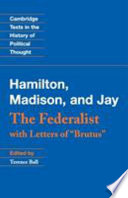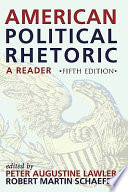 | Richard M Battistoni - Law - 2000 - 198 pages
...to one, in exclusion of the other. The rule which has obtained in the courts for determining their relative validity is, that the last in order of time...positive law, but from the nature and reason of the thing. It is a rule not enjoined upon the courts by legislative provision, but adopted by themselves,... | |
 | Ellen Frankel Paul, Fred D. Miller (Jr.), Jeffrey Paul - Philosophy - 2001 - 282 pages
...interpretation of statutes are nowhere mentioned in the Constitution. As Hamilton remarked, they are "not derived from any positive law, but from the nature and reason of the thing."6 Somewhat later, in Federalist No. 81, Hamilton went on to point out that the notion of "parliamentary... | |
 | Hadley Arkes - Law - 2002 - 326 pages
...interpretation of statutes are nowhere mentioned in the Constitution. As Hamilton remarked, they were "not derived from any positive law, but from the nature and reason of the thing." 3 Somewhat later, in the Federalist #81, he went on to point out that the notion of "parliamentary... | |
 | Alexander Hamilton, James Madison, John Jay - History - 2003 - 692 pages
...effect to one in exclusion of the other. The rule which has obtained in the courts for determining their relative validity is that the last in order of time...positive law but from the nature and reason of the thing. It is a rule not enjoined upon the courts by legislative provision but adopted by themselves,... | |
 | Paul O. Carrese - Law - 2010 - 350 pages
...confident pronouncements of Coke more than the subtle qualifications of Montesquieu or Blackstone: But this is a mere rule of construction, not derived...positive law, but from the nature and reason of the thing. It is a rule not enjoined upon the courts by legislative provision, but adopted by themselves... | |
 | Alexander Hamilton, James Madison, John Jay - History - 2003 - 642 pages
...to one, in exclusion of the other. The rule which has obtained in the courts for determining their relative validity is that the last in order of time shall be preferred to the first. But this is mere rule of construction, not derived from any positive law, but from the nature and reason of the... | |
 | Donald P. Kommers, John E. Finn, Gary J. Jacobsohn - Law - 2004 - 502 pages
...in the courts for determining their relative validity is, that the last in order of time shall lie preferred to the first. But this is a mere rule of...positive law, but from the nature and reason of the thing. It is a rule not enjoined upon the courts by legislative provision, but adopted by themselves,... | |
 | Peter Augustine Lawler, Robert Martin Schaefer - Political Science - 2005 - 444 pages
...effect to one in exclusion of the other. The rule which has obtained in the courts for determining their relative validity is that the last in order of time...positive law but from the nature and reason of the thing. It is a rule not enjoined upon the courts by legislative provision but adopted by themselves,... | |
 | Scott J. Hammond, Kevin R. Hardwick, Howard Leslie Lubert - History - 2007 - 1236 pages
...to one, in exclusion of the other. The rule which has obtained in the courts for determining their consent, enslave himself to any one, nor put himself under the absolute, arbitrary power of anot mere rule of construction, not derived from any positive law, but from the nature and reason of the... | |
| |